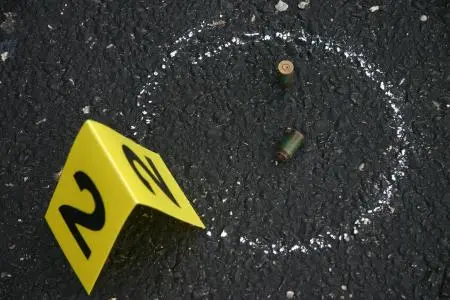Your story opens with a female detective kicking in the front door of a drug dealer's house. She points her gun into the darkness of the entryway. Wait! What kind of a gun is it? Is it a Beretta 92FS pistol? Or is it a Mossberg 500 Tactical Tri-Rail Forend shotgun? How many times can she shoot before it needs to be reloaded? Will the muzzle flare light up the hallway when she fires?
Throwing firearms into your fiction can raise lots of questions. But don’t panic about the answers. Finding them is easy with the wealth of resources that the internet makes available. This article will help you avoid common mistakes when writing about firearms, as well as highlighting common misconceptions and myths about guns.
Learn Your Lingo
That item your character found on the floor of the villain's basement is a magazine and not a clip. That evidence bag holds a bullet, not a shell. Gun aficionados take the small stuff seriously and the probability of your reader being a gun owner is high given recent statistics. There are now more guns than people in the United States, and contrary to what the Canadian media would have you believe about the peaceful nature of their country, roughly 30% of Canucks own a firearm. If you write about the barrel of a gun when you actually mean the slide or the muzzle, you’ve immediately lost your authority with any readers who are familiar with guns. These might seem like insignificant details, but one bad choice can ruin an entire scene for your reader. If you’re not sure about gun terminology, take time to do your research and get it right. A simple Google image search for ‘firearm parts’ or a regular search for ’firearm terminology’ will set you on the right path.
Arming Your Characters
Is your character a city police officer, a state trooper or an FBI agent? Different law enforcement groups are issued different types of weapons. If your main character is packing heat, make sure it’s the proper make and model for whatever outfit he or she is working with. The guns used by different agencies also change over time, so also make sure your standard issue firearm fits the year that you're setting your story in. Once you're armed with your character’s agency and the time period, you can confirm their weapon of choice with a quick internet search.
If your character is not employed by law enforcement, you need to base their firearm choice on suitability for the character. As a rule of thumb, smaller characters will use lighter calibers. The caliber of a firearm is the internal diameter or bore of a gun barrel or the diameter of the bullet it fires. It can be measured in inches or millimeters. That’s why we have 9mm and .357 caliber pistols. As a general rule, the bigger the caliber of the rifle or handgun, the bigger the projectile it fires.

Shotguns are classed according to gauge rather than caliber, but the concept is similar. According to Wikipedia, the gauge of a shotgun refers to how many lead spheres, each with a diameter equal to that of the bore, amount to one pound in weight. Confused? Relax. Don’t get bogged down in the technical aspects you’ll find in your research. Around 50% of the shotguns in the United States are 12-gauge, and the next most popular is a 20-gauge which has less weight and recoil than the 12-gauge. Ten gauges are also common and the .410 shotgun (that’s not the gauge, but the bore measurement…don’t ask) has very little kick making it popular with young shooters. Stick with one of these shotguns and you should be safe.
If your protagonist is a 300-pound gorilla who works as a hitter for the mob, then caliber or gauge isn’t going to be an issue. But an elderly female armed for self-defense wouldn’t be using a weighty high-caliber gun that won’t fit in her purse. However, if she’s a former FBI agent, she may use the same type of gun she was issued by the Bureau out of familiarity. An odd gun choice can be used to reveal more about the history and personality of the character than you think.
Once you decide what type of gun your character is going to use, research the specifications of that particular firearm so you can get the details right. For example, determine at what distance it ceases to be accurate. If a professional shooter couldn’t hit a standard target at fifty feet with a particular gun in perfect range conditions, how could your detective hit a fleeing robber in a rainstorm at seventy-five feet? Most gun models have specs and detailed information about them online. And the beautiful thing about guns is that they are a lot like children and dogs — their owners love to talk about them to strangers. If you’re interested in learning more about the technical aspects of firearms, visit your local range or contact your nearest gunsmith to have all your specific questions answered.
Debunking the Myths
Films, books and television shows have been telling us lies about guns for decades. Most guns will let you know when you’re out of bullets before you pull the trigger again and they don’t go click-click-click when they run out. People who get blasted by shotguns don’t fly through the air like they’ve been hit by a truck. Gas tanks won’t explode when you shoot them. Dropped guns don't discharge when they hit the ground. These are all firearm myths that we encounter in popular culture. Author Chuck Wendig addresses many of these and more in an excellent and hilarious blog post found here. And more can be found in The Writers’ Guide to Weapons by Benjamin Sobieck. This book is loaded with useful information. I keep a copy on my bookshelf. It delves much deeper into all the topics I mentioned here with lots of great diagrams and pictures for reference. You can check out an excerpt of that guide here.
A Parting Shot
I'm already bracing for the hate mail and corrections on this article from gun experts. As always with research and technical writing, try not to get lost in the details. If firearms aren’t a big part of your story, don’t feel the need to get super-specific about every gun that appears in your manuscript. You don’t always need to bore us to death writing about the intricacies of the firing mechanism or the serial number on the barrel. To paraphrase Wendig, there’s nothing wrong with simply writing, “He pointed the gun and pulled the trigger.”

About the author
Repo Kempt has worked as a criminal lawyer in the Canadian Arctic for over ten years. He is the author of a book about seal hunting, a member of the Horror Writers Association, and a guest columnist for the Canadian Broadcasting Corporation. He lives on a cricket farm with his wife, Joy and his little dog, Galactus. In his spare time, he looks for an agent for his latest manuscript.







